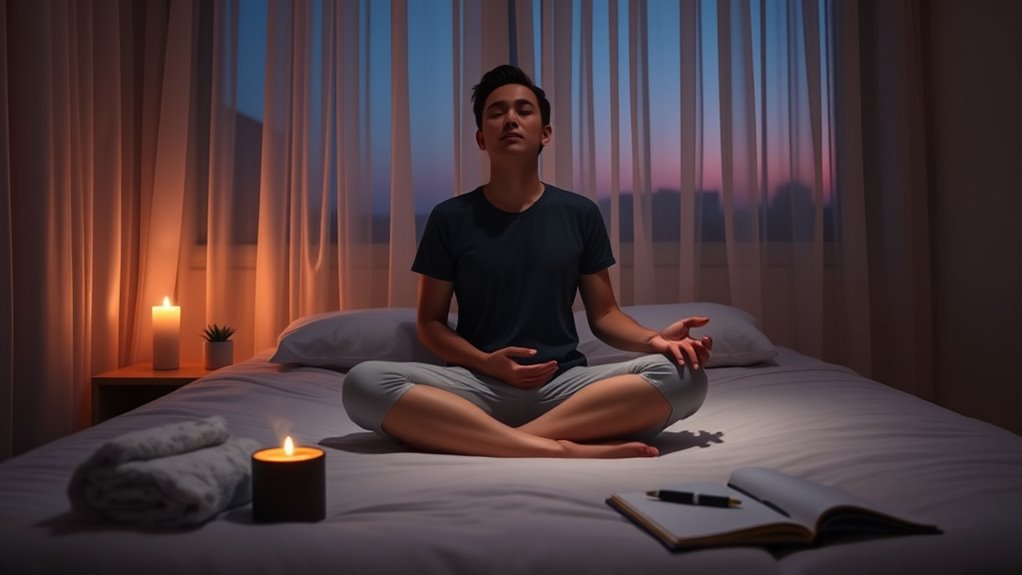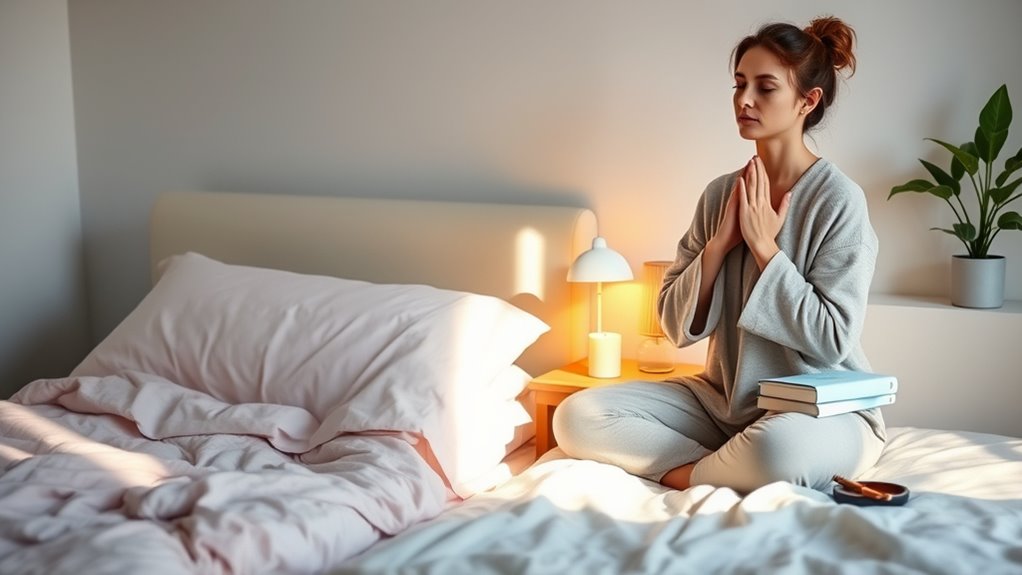Stress can markedly disrupt your sleep by causing racing thoughts and physical tension that make it hard to fall asleep or stay asleep. This ongoing tension creates a cycle of poor rest and heightened anxiety. Luckily, techniques like mindful breathing and progressive muscle relaxation can help calm your nervous system. Incorporating routines such as these, along with magnesium-rich drinks like wheatgrass juice, can improve your sleep quality. Keep exploring to discover simple ways to manage stress and enjoy better nights.
Key Takeaways
- Stress disrupts sleep by causing racing thoughts and physical tension, making it hard to fall and stay asleep.
- Relaxation techniques like mindful breathing and progressive muscle relaxation help calm the nervous system and reduce stress.
- Regular practice of these methods before bed can improve sleep quality and establish a restful nightly routine.
- Deep breathing slows heart rate and lowers blood pressure, promoting relaxation and easing the transition to sleep.
- Incorporating magnesium-rich foods like wheatgrass juice can support muscle relaxation and enhance relaxation efforts.

Stress can considerably disrupt your sleep, making it harder to fall asleep and stay asleep throughout the night. When your mind races with worries or your body feels tense from the day’s pressures, relaxation becomes elusive. To combat this, you can turn to relaxation techniques that help calm your nervous system and prepare your body for rest. Two effective methods are mindful breathing and progressive muscle relaxation, both designed to reduce stress and promote restful sleep.
Mindful breathing is a simple yet powerful practice that centers your attention on the present moment. As you lie in bed, focus on your breath—inhale slowly through your nose, feeling your chest rise, then exhale gently through your mouth. Pay close attention to each breath, noticing the sensation of air entering and leaving your body. This technique helps slow your heart rate, lower blood pressure, and quiet your racing thoughts, making it easier to drift off. You don’t need any special equipment or long training; just a few minutes of mindful breathing can substantially reduce stress levels and prepare your mind for sleep.
Progressive muscle relaxation works by systematically tensing and then releasing different muscle groups in your body. When you’re stressed, your muscles often stay tight, which can create a cycle of tension and anxiety that interferes with sleep. To perform this technique, start at your toes and tense the muscles for about five seconds, then relax completely. Move upward through your body—calves, thighs, abdomen, chest, arms, neck, and face—tensing and relaxing each region. As you do this, focus on the sensation of relaxation washing over your muscles. This process not only relieves physical tension but also distracts your mind from worries, encouraging a calmer state conducive to sleep. Additionally, incorporating wheatgrass juice into your evening routine can help promote relaxation due to its rich magnesium content, which supports nerve health.
Both mindful breathing and progressive muscle relaxation can be incorporated into your nightly routine with ease. You might find it helpful to set aside a few minutes before bed, sitting or lying comfortably, to practice these techniques. Consistency is key—over time, they’ll become more effective at reducing your stress response and helping you establish a peaceful, restful sleep pattern. Remember, the goal isn’t to eliminate all stress but to manage it better so it doesn’t control your nights. By actively engaging in these relaxation practices, you take control of your sleep health and create a more tranquil environment for restful nights ahead.
Frequently Asked Questions
Can Stress Cause Long-Term Changes to Sleep Patterns?
Yes, chronic stress can cause long-term changes to your sleep patterns. When you’re under ongoing stress, it triggers hormonal imbalance, especially increasing cortisol levels, which makes it harder to fall asleep and stay asleep. Over time, this can disrupt your circadian rhythm, leading to persistent sleep issues. You might notice difficulty relaxing at night or feeling unrested, and addressing stress early can help prevent these lasting sleep disturbances.
Are There Specific Foods That Help Reduce Stress-Induced Sleep Problems?
You can try superfood options like bananas, oats, and almonds, which boost your magnesium and serotonin levels, helping reduce stress-induced sleep problems. Herbal remedies such as chamomile tea, lavender, and valerian root are also effective in calming your mind before bedtime. Incorporate these foods and remedies into your routine to naturally promote relaxation, improve your sleep quality, and combat stress-related sleep issues.
How Does Stress Affect Different Stages of Sleep?
Stress crashes into your sleep like a hurricane, disrupting your sleep architecture. It elevates cortisol levels, making it harder to fall asleep and stay asleep. During the early stages, stress can shorten REM sleep, essential for memory and mood. In later stages, it may cause fragmented sleep. The cortisol influence keeps your body in overdrive, preventing restful, restorative sleep and leaving you exhausted.
Can Relaxation Techniques Improve Sleep Quality Instantly?
Yes, relaxation techniques like mindfulness meditation and deep breathing exercises can improve your sleep quality quickly. When you practice these methods before bed, they help calm your mind and reduce stress, making it easier to fall asleep and stay asleep. With consistent practice, you’ll notice relaxing effects that can lead to better sleep even after just one session, supporting your overall well-being and stress management.
Are There Age-Specific Relaxation Methods for Stress Management?
Yes, there are age-specific relaxation methods for stress management. For children, techniques like deep breathing, guided imagery, and gentle exercises help address childhood stress effectively. Adults might benefit from mindfulness, meditation, or progressive muscle relaxation tailored to their needs. Adapting these methods to different age groups guarantees better stress relief, improves sleep quality, and promotes overall well-being, making relaxation techniques more effective for everyone.
Conclusion
Think of stress as a turbulent river, and your sleep as a calm boat trying to sail through. Relaxation techniques act as sturdy anchors, grounding your boat amid the chaos. By embracing these methods, you’re steering your vessel toward peaceful waters, ensuring restful nights. Remember, you hold the oars—each mindful breath and gentle stretch guides you closer to serenity. With patience and practice, you’ll navigate stress’s currents and find tranquil shores of restorative sleep.








